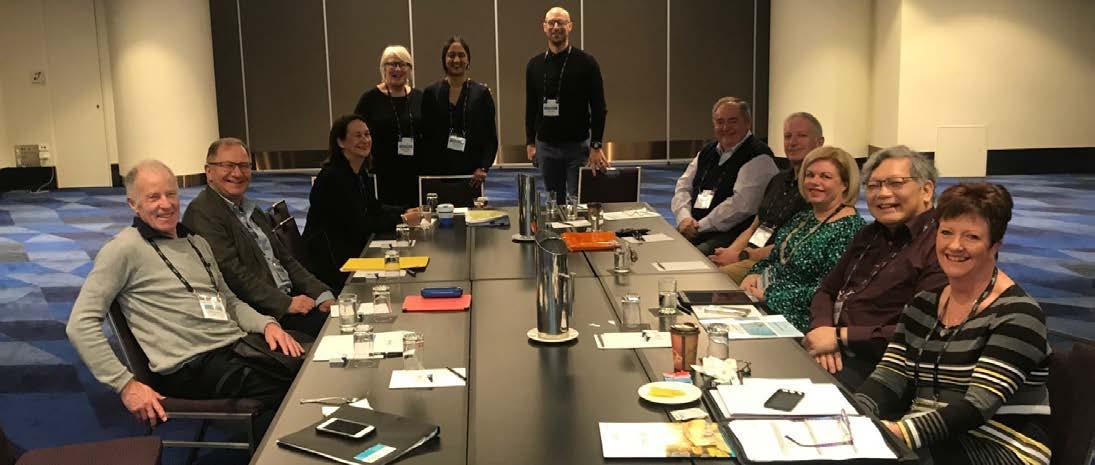
30 minute read
Research Highlights – Committee Reports
Research Highlights
Scientific Advisory Committee: Ian Davis and Martin Stockler
CHAIR IAN DAVIS DEPUTY CHAIR MARTIN STOCKLER
The ANZUP Scientific Advisory Committee (SAC) provides overall scientific oversight of ANZUP’s activities. It was established and is constituted to ensure that ANZUP receives strategic guidance from a broad and diverse range of disciplines, crafts, and individuals . The SAC coordinates, reviews, and prioritises research ideas through their development for ideas through to concepts and on to mature proposals and finally full research initiatives. It does so under the guidance of the ANZUP Strategic Plan 2018-2020, and provides advice to the Board to help it make strategic and operational decisions to enable those initiatives to be achieved . Meetings of the SAC allow for input and “horizon scanning” across the areas of clinical need and emerging science, to help inform development of ideas that will remain relevant to the wider community even after several years of trial conduct and analysis . The SAC is also a mechanism through which ANZUP can communicate with the various stakeholder groups and organisations represented by the SAC membership . This helps ANZUP move towards its goal of improving outcomes by generation of new evidence, and implementation of those research findings in the clinical and wider community through changes in health care policy and practice . The ANZUP Strategic Plan 2018-2020 is due for renewal . A component of that process will involve input from the SAC, to help ensure that appropriate scientific direction is included, together with multidisciplinary inclusiveness and broad applicability and relevance of what we do . We will continue to look for areas of unmet clinical need, gaps in knowledge, emerging scientific evidence, opportunities to work creatively together, ways to involve ANZUP and the wider community more effectively, and investigate new models of care and of research that will open up further directions to pursue . The SAC agenda has increasingly moved away from a reporting and specific oversight role, functions now largely delegated to specific Trial Management Committees; to more robust and engaging processes of strategic development .
Membership of the SAC is reviewed annually by the Board in the light of recommendations from the various professional bodies or special societies represented in its composition . All ANZUP members are welcome and invited to participate in ANZUP’s broader scientific processes, such as subcommittees, workshops, educational and training events, career development initiatives, and participation in our Annual Scientific Meeting. We are also open to suggestions on how to improve our systems, structures, and processes even further .
Bladder, Urothelial and Penile Cancer (BUP) Subcommittee: Dickon Hayne and Shomik Sengupta
CHAIR DICKON HAYNE DEPUTY CHAIR SHOMIK SENGUPTA
We have now had 12 months to settle into the renamed subcommittee - and we have definitely focussed on bladder, urothelial and penile cancer over the past year .
Starting in March 2020, we saw significant changes made by institutions so they can manage COVID-19 . This has and will continue to have an impact on usual trial operations - but some Bladder, Urothelial and Penile cancer trials were progressing pre-pandemic and have continued to do so . Below is an update on BUP committee activity and additional developments .
Currently recruiting ANZUP trials
BCGMM
The BCG-mitomycin study, comparing sequential BCG & mitomycin to standard BCG for high-risk non-muscle invasive bladder cancer (NMIBC), has recruited steadily and has 264 patients of a planned 500 patients accrued . The UK site and two more sites in Australia are to open in the coming year .
Global BCG and mitomycin shortages continued throughout the year, causing numerous problems and making the management of patients very difficult.
PCR MIB
The PCR-MIB study was temporarily suspended in March 2020 . Up until that point, the 21st patient (of 30) was screened and recruited to the study .
An interim analysis was conducted that showed no new safety concerns and an abstract was submitted to GU ASCO based on pre-designed stopping rules .
Potential future studies update
ACCEPT
ACCEPT multicentre cystectomy database is collecting data from West Australian centres, with ethics and governance review underway to open at other sites interstate . It is hoped this database will not only provide a much-needed audit of cystectomy practices but also enable implementation and evaluation of interventions such as Enhanced Recovery pathways . The South Metro Health Service Human Research Ethics Committee (HREC) in WA is now the lead HREC for the national mutual acceptance process . Therefore, all public hospitals now have ethics approval . Each site will require governance approval .
Due to the low-risk nature of the study, waiver of consent has been obtained for retrospective and prospective data collection (rather than the opt-out consent previously required) . In addition, the entire ethics approval process was completely re-done by Cynthia Hawks from Fiona Stanley Hospital . This will mean it becomes easier to open centres and result in a large, multi-centre audit .
NMIBC
Developing a Patient-Reported Symptom Index for Non-muscle Invasive Bladder Cancer .
Water irrigation for low/intermediate risk (non-muscle invasive bladder cancer), NMIBC, is a Below the Belt funded single centre pilot study, with plans for a subsequent ANZUP trial to compare it to post-resection chemotherapy . Currently, patients are being enrolled on a 30-patient, single-arm pilot ‘WATIP’ study . Patients are given a trans-urethral resection of bladder tumour (TURBT) or bladder endoscopic treatment followed by 3 hours of post-operative water irrigation .
As at 31 March 2020, 20 patients out of a total of 30 patients have been recruited . Elective surgery was impacted by COVID-19 so it is hoped the remaining 10 patients will accrue over the next 3-6 months .
So far the procedure has been feasible and no safety issues have been found . Samples have been collected from study patients together with samples from standard saline-irrigated patients . At each time point it has been found there are fewer numbers of viable cells in the water-irrigated samples compared to the saline-irrigated cells .
A grant application for a randomised trial was unsuccessful last year, however the application is being amended to include this latest data and will be resubmitted in 2020 .
Exercyst
The Exercyst trial is titled -Exercise Medicine Prior to Open Radical Cystectomy: Feasibility and Preliminary Efficacy. To date 14/20 patients have been recruited to this single-arm exercise study and 10 patients have completed the study . Recruitment should hopefully be completed by the end of 2020 . The study is progressing well .
In addition, Exercyst 2 is being developed . It will be a postoperative exercise trial with dose escalations, looking at the feasibility and safety of immediate post-operative exercise after major abdominal surgery .
SUBDUE-1
The 2019 Below the Belt grants included funding for a Phase I study of sub-urothelial injection of durvalumab (SUBDUE-1) . The study is open and was recruiting within 12 months of the initial idea for the concept being formulated . Two patients have been recruited thus far .
This trial looks at feasibility and toxicity of a sub-urothelial injection of durvalumab as a potential new primary treatment for non-muscle invasive bladder cancer . The trial recruits patients already scheduled for cystectomy and involves administration of the drug into the bladder wall with a dose escalation protocol .
ANZUP has been heavily involved in the development of the study, which is running only at Fiona Stanley Hospital and is sponsored by South Metro Health Services . AstraZeneca is providing durvalumab but no other support for the study . The trial is funded by a Below the Belt grant and another local grant (Spinnaker) in WA has been obtained for translational work .
Concept Development Workshops
The Concept Development Workshops (CDW) are now an integral component of new trials development . They give members a unique opportunity to present new concepts, participate in robust discussion around gaps in research and plan for future grant applications .
Our BUP Concept Development Workshop was held in Sydney in April 2019 with over 20 attendees and 5 concepts presented .
The BUP Committee looks forward to further progression of concepts and trials . We would like to thank all BUP committee members, trial centres and collaborators, and most importantly the trial participants . We look forward to another productive year – hopefully without any unexpected hurdles .
Renal Cell Cancer Subcommittee: David Pook and Craig Gedye
CHAIR CRAIG GEDYE DEPUTY CHAIR DAVID POOK
Over the past year the Renal Cell Subcommittee has continued to work towards the mission of improving treatments and outcomes for patients of kidney cancer . The year has been challenging, productive, rewarding with going activity, developments and the progression of renal cell trials .
The UNISoN study continued to recruit extremely well over the past 12 months . It now has only a few patients remaining on part one of the trial who are soon to transition to part two . Yet again we are very grateful to the teams working on this study around Australia .
The KeyPAD study continues to recruit, but recruitment has been slow. The incidence of RCC classified as IMDC
favourable risk appears to be decreasing in Australia, and most patients have intermediate or poor risk RCC . We are now contacting referring doctors at KEYPAD sites to crossrefer patients . In addition, the possibility of opening the study in New Zealand is being explored as well as a radical change in protocol to include a new cohort of patients . New trials also continue to thrive, with the UNICAB study – developed by Dr . David Pook and Dr . Carol Harris alongside ANZUP and BaCT . The UNICAB study aims to test the efficacy of cabozantinib in those who have taken immune checkpoint inhibitors for non-clear cell kidney cancer, and we eagerly anticipate the results of this trial .
The UNICAB study opened across 11 sites in Australia with a target of 48 participants . This study is an exciting phase II trial of cabozantinib in patients with metastatic or unresectable non clear-cell renal cell carcinoma who have progressed on, or are not candidates for immunotherapy . UNICAB was designed as a partner to the UNISoN study, as patients can be enrolled on UNICAB if they progress on UNISoN . The study also provides a treatment option for patients who have medical conditions that do not allow them to be treated with immunotherapy . In addition, UNICAB is being extended as a tele-trial model at Border Medical Oncology. ANZUP will be the first Cooperative Trials Group running a trial by telehealth .
As we look ahead we have high expectations for another successful, busy year, hopefully without the challenges presented by the COVID-19 pandemic . We look forward to the growth of renal cell trials, and another productive year for the Renal Cell Cancer Subcommittee . Plans for future studies continue and we would like to thank all the RCC subcommittee members, our clinical trial sites, our NHMRC Clinical Trials Centre collaborators, and most importantly, all trial participants .
Prostate Cancer Subcommittee: Scott Williams and Lisa Horvath
CHAIR SCOTT WILLIAMS DEPUTY CHAIR LISA HORVATH
Exciting achievements and new studies over the past 12 months have helped ensure ANZUP remains a wellrecognised co-operative group in prostate cancer clinical trial research . The Prostate Cancer Subcommittee continues to grow even with the challenges faced due to the COVID-19 pandemic . ANZUP has remained committed to running the prostate cancer trials and can report on trial developments and achievements .
ENZAMET
ANZUP’s ENZAMET trial certainly took centre stage this year .
In June we celebrated a major achievement with ENZAMET featuring as a Plenary Session at the 2019 American Society of Clinical Oncology (ASCO) Annual Meeting . Congratulations to Study Co-Chairs ANZUP Chair Prof . Ian Davis and Prof . Christopher Sweeney who presented the results at ASCO .
The results generated much media and social media interest and certainly put ANZUP on centre stage .
It didn’t stop there; in December enzalutamide received U .S . FDA approval for treatment of men with metastatic hormonesensitive prostate cancer, and on 4 February 2020 on World Cancer Day ASCO released its Clinical Cancer Advances 2020: ASCO’s Annual Report on Progress Against Cancer, and our ENZAMET study was selected for inclusion in this year’s edition . You can read more about ENZAMET on page 28 in this report .
In addition, an International Trials Steering Committee has been established for ENZAMET (as well as ENZARAD) translational studies on the large bioresource associated with these studies . This includes representatives from all regions with specific expertise. The Committee meets formally every six months via teleconference . A sub-group of four experts meets monthly to prioritise proposals for the use of specimens . Detailed proposals with budgets are currently being finalised for submission for funding.
TheraP
Accrual completed for the initial analysis of TheraP, the randomised trial of cabazitaxel chemotherapy against 177Lutetium-PSMA in castrate-resistant disease . An abstract related to early exciting results was submitted to ASCO 2020, for their virtual meeting in May . Again, this trial has amassed substantial national and international interest, showcasing the strength of Australian research teams in the global sphere of clinical trial research .
ProPSMA
The primary analysis for the ProPSMA study, (co-badged with ARTnet and TROG) has been completed . This study had been booked for a Plenary Session at the EAU in Amsterdam, however the EAU was cancelled due to COVID-19 . It was published in the Lancet on 21 March and will be another headline study for Australia in the PSMA space .
Pain-Free TRUS B
The Pain-Free TRUS B randomised trial completed accrual and this study has an instantaneous endpoint . A recruitment total of 420 patients was achieved following ongoing contributions from our NZ study leaders . The analysis plan is now being discussed .
Upcoming studies – due to open in the 2020/2021 reporting period DASL-HiCaP
DASL-HiCaP is an ANZUP-led randomised phase 3 trial adding darolutamide to androgen deprivation therapy and definitive or salvage radiation in high risk, clinically localised prostate cancer . Study Co-Chairs Associate Professor Tamim Niazi and Professor Christopher Sweeney are excited with the potential this trial has for patients .
ENZA-p
ENZA-p is an ANZUP-led randomised phase II trial using PSMA as a therapeutic agent and prognostic indicator in men with metastatic castrate-resistant prostate cancer treated with enzalutamide . This study is being led by Associate Professor Louise Emmett from St Vincent’s Hospital in Sydney . The study aims to recruit 160 patients, across 12 sites – with the view to open the study by mid-2020 . Initially 10 sites (which have been used for TheraP) are planned to be opened for this study .
#UpFrontPSMA
#UpFrontPSMA is a Randomised Phase 2 Study of Sequential 177Lu-PSMA617 and Docetaxel Versus Docetaxel in Metastatic Hormone-Naive Prostate Cancer . Study Co-Chairs are A/ Prof . Arun Azad and Prof . Michael Hofman from the Peter MacCallum Cancer Centre . This study will be run at sites that participated in ENZA-p and will be co-badged by ANZUP and VCCC/ the Peter MacCallum Cancer Centre .
Germ Cell Cancer Subcommittee: Ben Tran and Fritha Hanning
Concepts
With the renewal of our Memorandum of Understanding for our PCFA ANZUP Partnership Grant for a further three years, ANZUP called for prostate cancer concepts late in 2019 .
A number of high quality concepts were submitted and the shortlisted applicants presented their concepts to a multidisciplinary panel on Tuesday 26 November 2019 . Many creative and interesting concepts were reviewed and discussed .
The next ANZUP PCFA sponsored protocol was awarded to Shahneen Sandhu for her novel concept: Lutetium-PSMA with ipilimumab and nivolumab in metastatic hormone naive prostate cancer (mHNPC) .
Exciting achievements and new studies continue to make sure ANZUP is well-recognised in prostate cancer clinical trial research . We look forward to another busy and successful year ahead – hopefully with less social distancing and COVID-19 challenges! We extend our thanks to the Prostate Cancer Subcommittee for their commitment and enthusiasm to improving treatments and outcomes in prostate cancer .
CHAIR BEN TRAN DEPUTY CHAIR FRITHA HANNING
The Germ Cell Subcommittee has again been very busy welcoming new members who have contributed to research activity, including trainees . The focus for the past 12 months was to proceed with a surgical study (currently in protocol finalisation) and also secure funding for a study examining the role of miR-371 in clinical stage 1 disease and tools to address fear of cancer recurrence .
Highlights of the year in review for the Germ Cell Subcommittee include:
TIGER
Globally, this is a very important study with potential to change practice . It is pleasing to have TIGER open at multiple sites in Australia . We have now recruited 5 Australian patients and sites continue to work hard to identify suitable patients . TIGER compares TIP versus TICE (high dose with stem cell rescue) as first salvage for platinum refractory disease.
iTestis
iTestis continues to expand, opening at multiple sites across the country . iTestis now holds data on over 200 testicular cancer patients . In order to provide a true representation of testis cancer treatment and outcomes across the country, we need to engage additional sites from all states and territories . iTestis is Australia’s testicular cancer registry . It has a user friendly web-based interface and facilitates prospective collection of high quality clinical data . iTestis has received ANZUP Below the Belt funding and launched in late 2018 . Understanding how we treat testicular cancer in Australia will help improve outcomes for all patients . Additionally, having iTestis as a robust data collection tool will facilitate registry based trials to examine new questions aimed at helping patients live better lives .
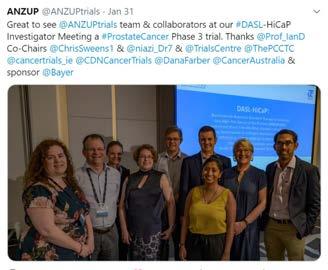
P3BEP
P3BEP continued to recruit well over the past year . 119 patients have now been recruited across ANZ, UK and COG sites . A/Prof Peter Grimison continues to be the driving force behind this important Australian-led, international, 2-stage open-label randomised phase 3 trial study which will determine if accelerated BEP is more effective than standard BEP as first-line chemotherapy for men, women and children with intermediate- or poor-prognosis advanced GCTs .
In the pipeline
Over the past year, the team has worked hard to get these projects up and running:
1) PERMEATE is a clinical trial with the dual objectives of defining a role of miR-371 in stage 1 testicular cancer and using a novel tool to address fear of cancer recurrence in this patient cohort . Ben Tran leads an ANZUP MRFF grant, submitted in Feb 2020, which will serve as a parallel study to both SWOG 1824 and AGCT1531, two international studies which have only recently started recruiting patients . We all eagerly await the outcome of this submission .
2) PRESTIGE is a single arm surgical cohort study examining the impact of primary RPLND for stage 2 seminoma and non-seminoma on health related quality of life . As the focus on survivorship in testicular cancer has increased, the need to minimise treatment related toxicities has become apparent . As such, there is a renewed shift towards primary RPLND as opposed to chemotherapy or radiotherapy for selected patients with stage 2 seminoma and non-seminoma . As studies examining this continue to recruit globally, there is a knowledge gap which needs to be addressed, that being the impact of such surgery on quality of life. PRESTIGE aims to fill this gap by describing the impact of RPLND on short and long term HRQoL, in particular, its impact on sexual function .
3) An ANZUP survivorship care plan is being developed to help testicular cancer patients live normal healthy lives after completing their treatment . Jeremy Lewin has led a herculean effort to generate a document which is relevant across Australia and NZ . We look forward to having this available to all our patients .
4) Hypogonadism is a complex issue in testicular cancer survivors and is generally divided into primary and secondary causes . Secondary causes are underappreciated, being a consequence of being overweight and therefore potentially more common in today’s society .
Feasibility studies using iTestis are underway to determine the true proportion of secondary hypogonadism in testicular cancer survivors .
International collaborations
Through TIGER and P3BEP, the ANZUP germ cell subcommittee continues to foster strong international links . Additionally, other translational projects and future clinical trial planning continue to build upon this . The global academic germ cell community is a dedicated and passionate group of clinicians . We all work closely together with the aim of improving the lives of these young men . ANZUP has contributed to updates in the International Germ Cell Cancer Group Prognostic classification 2.0, and continues to be intimately involved in the Movember led Global Action Plan -5 focused on identifying biomarkers of platinum resistance .
The past year has been productive and challenging in ways we did not expect . We would like to thank the enduring hard work, talent and dedication of the sub-committee members and trials teams who have remained focussed and continue to help us improve outcomes for patients with germ cell cancer .
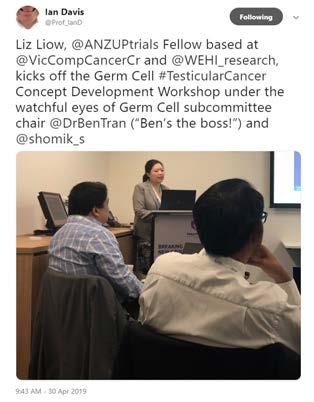
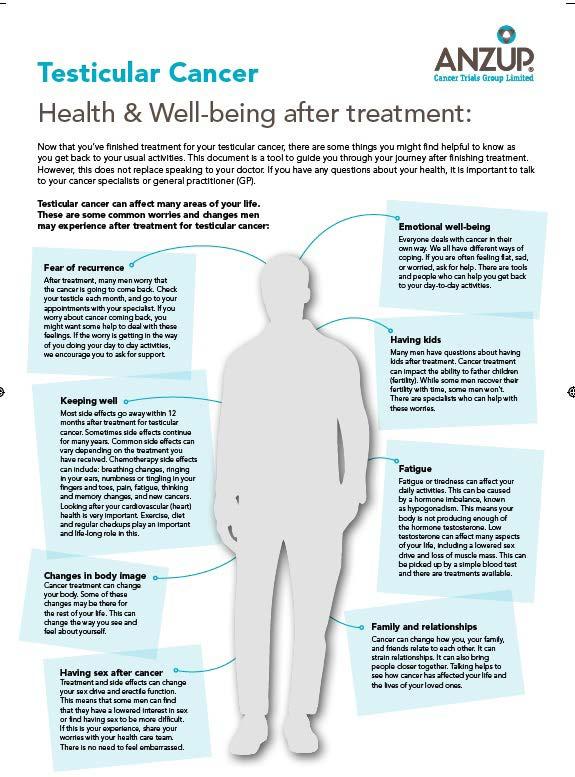
Quality of Life and Supportive Care Subcommittee: Haryana Dhillon and Catherine Paterson
CHAIR HARYANA DHILLON DEPUTY CHAIR CATHERINE PATERSON
As for so many of us, it has been a year of challenges, change and adaptation – but despite this the Quality of Life (QoL) and Supportive Care Subcommittee has had another industrious year. After a productive 2019, the first quarter of 2020 saw us transition rapidly to online care, teaching, meetings, and socialising, but progress continued to be made on projects falling under the remit of this committee .
Concept Development Workshops (CDWs)
The QoL subcommittee members have been committed to attending the tumour site subcommittee meetings and the CDWs on a regular basis over the past 12 months . Early input and engagement from those of us with a supportive care, psychosocial, and quality of life focus is critical to maximising the outcomes of ANZUP Clinical Trials. The aim of QoL involvement in each tumour site subcommittee meeting is to draw a Supportive Care and QoL perspective into each project, facilitating inclusion of nursing, supportive care, and QoL questions and substudies into ANZUP trials.
In addition to quality of life outcomes, we are assessing fear of cancer recurrence or anxiety and depression in other clinical trials . We are seeing an increase in discussion of patient experience during CDWs, the times at which data can best be collected as part of routine follow-up in a trial, and the requirement to include qualitative substudies to inform thinking about the problem and experience . This is exciting as it means we will be better placed in the future to assess for these concerns, develop and evaluate interventions, and even investigate implementation of evidence-based approaches within ANZUP’s clinical trials . We have also, with Richard De Abreu Lourenço, been working on the inclusion of preference assessments within a number of trials . This will help direct resource as needed to the psychosocial and supportive care needs that patients identify as part of their treatment decision-making .
ANZUP ASM 2019
Natasha Roberts reported preliminary results of her Janssen Fellowship at the Nurses Symposium . She is investigating patient experiences when participating in ANZUP clinical trials which will influence how we approach and support those taking part .
Gay Corbett presented her work on developing resources to support patients experiencing psychosexual challenges after a cancer diagnosis . This is work developed through the concept development workshops following participation in March 2018 .
Sonia Stratchen presented the work she led to implement a care plan for men on androgen deprivation in her region at the ASM Supportive Care Breakfast . The presentation stressed that the implementation of innovations in to practice requires substantial effort, dedicated time, and engagement of all stakeholders. There was a significant level of discussion about how to implement this care plan across the country .
Best of GU November 2019
The Deputy Chair, Associate Professor Catherine Paterson travelled to Adelaide to be part of ANZUP’s Best of GU . Catherine gave an overview of the work she has undertaken to identify the unmet needs of men with uro-genital cancers . A large portion of her focus has been in the area of penile cancer, a long neglected and challenging rare cancer, where there is plenty of work to be done .
Presentations from members at COSA November 2019
Several poster presentations from QoL subcommittee members were given at the Clinical Oncology Society Meeting (COSA) in Adelaide in November 2019 .
Natasha Roberts again presented the preliminary results of her qualitative study exploring patient experiences of participating in clinical trials. One of the key findings is that patients felt they take part in trials but don’t get to hear more about their progress and outcomes. These findings have led us to work with ANZUP’s Consumer Advisory Panel to develop innovative ways to improve patient experience .
Tam Bui gave a presentation based on survey results – ‘Experiences of genitourinary cancer nurses with scanxiety and tumour marker-related anxiety in people with cancer: results of a survey’ . A manuscript reporting the results of this survey has been drafted and will be submitted for publication .
Nicholas Ralph gave a presentation on the 10-year quality of life outcomes in men with prostate cancer . Using the results from 106 men recruited pretreatment, three trajectories were identified - HRQOL (physical, mental, and life satisfaction) . It was found ADT, comorbidities, and lower socioeconomic status indicates risk for poorer long-term quality of life . The question now, is how to support men at risk of poorer HRQOL to ensure they remain as well as possible for as long as possible .
New study: Online exercise for people with metastatic prostate cancer
Holly Evans, Camille Short and team launched an online exercise study for individuals with metastatic prostate cancer . The 8-week program involves an individually tailored exercise program, devised using an online algorithm . It also includes complementary education and telehealth support for participants .
So, as we emerge from the COVID-19 pandemic we will need to see how best to transform our models of care to keep what works from both telehealth and face-to-face care to deliver better personcentred care. In addition, the QoL subcommittee will continue to focus their energy on where the greatest contribution to ANZUP can be made . I look forward to another productive year ahead, in which we can continue to improve outcomes for the patients impacted by GU cancers .
Noel Castan Fellowship in Quality of Life
We are incredibly grateful to Anita Castan for her generosity in establishing this fellowship in her husband’s name . The initial Fellowship was awarded to Kath Schubach, a long-standing and active member of the QOL and Supportive Care Subcommittee, to expand the analysis of QOL data already collected as part of ANZUP trials . In carrying out this work Kath will be building our knowledge about the impact of GU cancers on individuals diagnosed with it and directing our attention to gaps in care that need to be filled with evidencebased interventions .
Translational Subcommittee: Arun Azad and Anthony Joshua
CHAIR, ARUN AZAD DEPUTY CHAIR ANTHONY JOSHUA
The year has proven to be another busy and productive one for the Translational Research Subcommittee, with a number of exciting highlights and important updates .
The Translational Research Symposium in July in Brisbane, part of the ANZUP Annual Scientific Meeting (ASM), was very successful and well attended. Our international speakers Betsy Plimack and Phuoc Tran gave outstanding talks and were ably complemented by our line-up of local speakers including Niall Corcoran, Ben Tran, Mitchell Lawrence, Ian Vela, Lisa Horvath and Lisa Butler . We extend our thanks to all our speakers for another fantastic Symposium and we look forward to once again showcasing the best of our translational research at the next ANZUP ASM .
The ENZAMET/ENZARAD Translational Research Steering Committee has overseen the selection of several key projects using correlative samples from ENZAMET . Thanks goes to the independent group that reviewed and prioritised proposals . The projects that will go forward will utilise cuttingedge technology to deliver critical correlative data from this pivotal, practicechanging trial . We are also very pleased that these translational studies will bring together a team of researchers from across the globe . Enhancing links with international translational researchers has been a key goal of the Translational Research Subcommittee and we are delighted that ENZAMET is providing a platform to achieve this . Although laboratory research is our major focus, there are additional opportunities to perform sub-studies using data from ENZAMET . One example is an imaging study led by Associate Professor Anthony Joshua that will correlate PSMA PET data with clinical outcomes .
While pushing forward with the planning for ENZAMET translational studies, we will also shortly commence planning for correlative samples collected for TheraP . We eagerly await the chance to commence translational research from this exciting study .
Bio-specimen collection continues as part of existing trials, including BCGMM, P3BEP, KEYPAD, UNISoN and PCR-MIB . As always, we are grateful for the patients and families who enrol on our trials and donate bio-specimens that underpin our translational research . We could not conduct our activities without these high-quality samples, and acknowledge the participating sites diligence in obtaining correlative samples from our ANZUP trials .
Moving forward, the Translational Research Subcommittee hopes to play a pivotal role in the development of new clinical trials with a primary translational endpoint, and we also look forward to another successful year ahead .
Consumer Advisory Panel: Belinda Jago and Ray Allen
CHAIR BELINDA JAGO DEPUTY CHAIR RAY ALLEN
ANZUP’s approach to all of its clinical trials is to centre the research question on its value to the community . The ANZUP Consumer Advisory Panel (CAP) are people who have either had a cancer diagnosis or have cared for a family member/ loved one, and have a demonstrated commitment to clinical trials research as a key strategy for improving the outcomes of those affected by genitourinary cancers . It is with great pleasure that I provide this 2020 Annual Report on behalf of the CAP .
Highlights of the year in review
• We welcomed two new CAP members Melissa Le Mesurier and Michael Twycross to the team as Bladder Cancer
Representatives . They attended the 2019 ASM to meet other CAP members and gain a better understanding about ANZUP and how the CAP interacts with the membership . We are delighted to have them on board .
• Attending the 2019 ASM to make connections is a mainstay of the CAP calendar . We had a half day face to face education session with excellent presentations from Ian Davis, Leonie Young, Scott Williams, Ben Tran,
Jaclyn Verghis and Nima Amatya . Lucy Byers and Marg Mc Jannett facilitated our final session with a group discussion on what the CAP can do to assist in promoting clinical trial research in the community. A significant outcome being the dissemination of ANZUP’s consumer magazine A little below the belt to the Cancer Centres and GP offices
across ANZ .
• We actively participate in the main scientific program and
CAP member Michael Tywcross represented the CAP in the bike ride challenge at the ASM dinner .
• We were able to raise awareness within the general community of the importance of considering clinical trials as part of a treatment program by taking part in the Community Engagement Forum . The CAP members chaired and presented at this forum . • Ray Allen (Deputy Chair) was invited to join a Survivorship
Essentials Expert Panel, with the Prostate Cancer
Foundation of Australia for a project aimed at identifying and prioritising the needs of prostate cancer survivors, with the added overlay of practical implementation .
• We had CAP representation at the ANZUP/PCFA
Partnership Grant Concept Workshop held in November 2019 with Ray Allen also attending a protocol development meeting to discuss Shahneen Sandhu’s concept that was selected for the grant: Lutetium PSMA with ipilimumab and nivolumab in metastatic hormone naive prostate Cancer (mHNPC) .
• I attended the 2019 ASCO meeting in Chicago on a patient advocate scholarship . The highlight of attendance was being present at the Plenary session with a large contingent of ANZUP members and supporters . Here
Chris Sweeney presented the positive results of the
ENZAMET study . The CAP had reviewed the ENZAMET patient information and consent forms back in 2014, and the results of this trial is what we had always hoped to see .
Other key activities in 2019/20 include:
The CAP had the opportunity to review Patient Information and Consent Forms for:
• SUBDUE • #UpFrontPSMA • DASL-HiCaP • ENZA-p
• CAP members were appointed as Associate Investigators for two studies . Matt Leonard on the PERMEATE testicular cancer trial and Belinda Jago on the ENZAMET biomarker cohort study .
• CAP members assisted with a grant application to pursue the next step of the CAP project aimed at raising awareness of clinical trials . This will follow on from the successful clinical trials video jointly produced with Breast Cancer
Trials . This is in line with ANZUP’s strategy to increase engagement with consumers, carers and the broader community to promote the importance of clinical trial research in GU Cancers. We will find out later in 2020 if ANZUP has been successful .
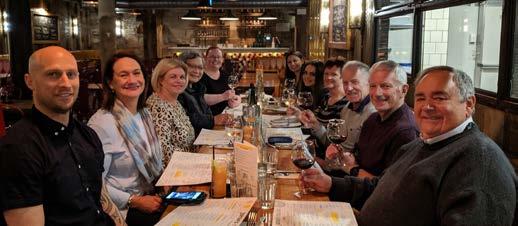
• CAP members have also participated in recent CREST Health Economics for Consumers and a recent QOL
seminar .
• We continue to have an active involvement in Concept Development Workshops, disease specific sub committees, the review panels for the BTB Research Fund, the
Mundipharma Fellowship, Astellas Young Investigators
Award, and the Nursing and Allied Health awards, Trial
Management Committees and a number of ad hoc requests by ANZUP members requiring consumer comments .
• We are willing supporters and contributors to ANZUP’s consumer magazine ‘A little below the belt’ and the Sydney and Melbourne Pedalthons .
In closing the CAP report for this year, the last quarter has certainly seen some big changes with the arrival of COVID-19 . In the ANZUP clinical trials space its activities have created a flurry of activity while we considered what needed to change quickly to ensure the safety of patients, health workers and employees . While we will miss our face to face interactions, some positive outcomes have been the better and more efficient use of our time through video conferencing and less travel – not a total substitute long term but we have learned a great deal . Telehealth and conducting clinical trials in a more remote fashion was already being developed but this has been given a big fast forward and ultimately will bring great benefit to the many thousands of Australians living in regional and rural areas through better access to clinical trials and healthcare in general .
The CAP remain committed to playing our part in providing advice from a consumer point of view to the ANZUP membership and the ever growing research portfolio . We are up to the challenges and opportunities that will no doubt be presented to us in the year ahead and would like to mark the year just completed as one for the history books .
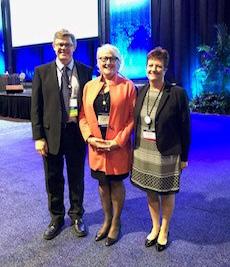
IAN DAVIS, MARGARET MCJANNETT AND BELINDA JAGO AT ASCO

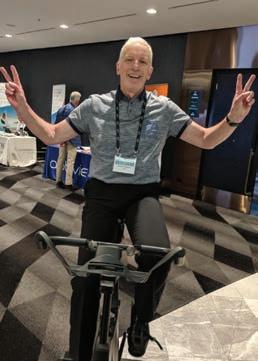
NEW MEMBERS MELISSA LE MESURIER AND MICHAEL TWYCROSS
